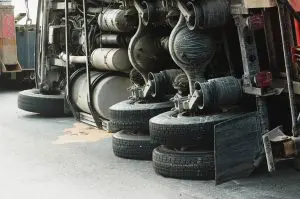How to File a Truck Accident Lawsuit
 Every time we get in our car, whether we’re going to work, to pick up the kids, to dinner, or anything in between, we expect to arrive safely at our destination. Most of the time, this is exactly what happens. But the devastating truth is that car accidents are a very real risk any time you’re on the road.
Every time we get in our car, whether we’re going to work, to pick up the kids, to dinner, or anything in between, we expect to arrive safely at our destination. Most of the time, this is exactly what happens. But the devastating truth is that car accidents are a very real risk any time you’re on the road.
While all accidents are terrifying, accidents involving trucks and other commercial motor vehicles are particularly dangerous. A truck accident is likely to cause far more damage and more serious injuries than most other kinds of motor vehicle accidents, given the size and weight of something like a semi-truck. It’s not uncommon for victims to endure something as serious as a traumatic brain injury.
Accidents involving large trucks can be life-changing events for all those involved, and in most cases, the inhabitants of passenger vehicles are the ones who bear the brunt of the damage. […]
Read MoreHow Long Could My Truck Accident Case Take to Settle?
Does It Take a Long Time For a Truck Accident Claim to Reach a Settlement?
 If you are involved in a truck accident, compensation for your settlement depends on many factors. In some cases, the truck accident claim can be settled within a few months and in others, it can take a few years before it reaches a conclusion. Truck accident claims involve commercial vehicles, which means there are more parties involved. Additionally, negotiations may fail to achieve adequate funds for victims, and the pursuit of a personal injury claim or wrongful death lawsuit is the proper course of action.
If you are involved in a truck accident, compensation for your settlement depends on many factors. In some cases, the truck accident claim can be settled within a few months and in others, it can take a few years before it reaches a conclusion. Truck accident claims involve commercial vehicles, which means there are more parties involved. Additionally, negotiations may fail to achieve adequate funds for victims, and the pursuit of a personal injury claim or wrongful death lawsuit is the proper course of action.
Unfortunately, it’s difficult to say how long a truck accident case can take to settle — anywhere from a few months to a few years. It usually depends on the willingness of all parties involved to reach a settlement and how complex the claim is. […]
Read MoreHow Can a Truck Accident Lawyer Help?
Why Do I Need a Truck Accident Lawyer After an Accident?
Dealing with the aftermath of a truck accident in Pennsylvania can be frustrating, stressful, and devastating. Faced with medical expenses, pain and sufferings, and lost wages, the road to recovery may seem long and hard for both you and your family. What you need is an experienced truck accident lawyer to help you receive the maximum amount of compensation for your losses, in a timely manner, so you and your family can start the healing process.
But how can a truck accident lawyer help your claim and why do you need one? Let’s explain.
A Truck Accident Lawyer Can Help With Deadlines and Evidence
 Timeliness is critical when establishing liability and the best possible financial compensation that you are entitled to. Reputable truck accident lawyers understand that timing is crucial to ensure a fair, […]
Timeliness is critical when establishing liability and the best possible financial compensation that you are entitled to. Reputable truck accident lawyers understand that timing is crucial to ensure a fair, […]
What is the Truck Accident Claim Process?
What Happens After a Trucking Accident?
 Being involved in an truck accident is a traumatic experience. Like a car accident, a truck crash can cause debilitating personal injuries and emotional distress–but due to the sheer size and force of the vehicle, truck accidents often cause more severe injuries and mental agony than an accident involving passenger cars alone.
Being involved in an truck accident is a traumatic experience. Like a car accident, a truck crash can cause debilitating personal injuries and emotional distress–but due to the sheer size and force of the vehicle, truck accidents often cause more severe injuries and mental agony than an accident involving passenger cars alone.
When you or a loved one is involved in a truck accident, the last thing you want to do is try and figure out the complicated truck accident claim process.
It is essential, however, that you act fast–while evidence is fresh and before the statute of limitations runs out–in order to ensure you receive the full and fair compensation you deserve. Thankfully, an experienced truck accident lawyer can handle most steps of the truck accident claim process for you, and at no charge to you unless you win a truck accident settlement or jury award. […]
Read MoreHow Can You Prove Who is Responsible For a Truck Accident?
How Difficult is It to Determine Fault in a Trucking Accident?
In some cases, determining fault in a car accident is fairly straightforward. There’s a clear party at fault, and a clear victim. But far more often that not, determining fault in truck accidents is a highly complex process. There are a great deal of potentially liable parties, and a huge amount of evidence that must be reviewed in order to correctly determine fault. What’s more, there is an inherent level of complication when a commercial truck is involved; this means that rather than navigating amongst passenger vehicles and their individual drivers, you must also navigate with a large company, which likely has extensive legal resources.
At Munley Law Personal Injury Attorneys, our truck accident lawyers believe that all truck accident victims deserve justice. We also understand that the legal system can feel overwhelming, […]
Read More








